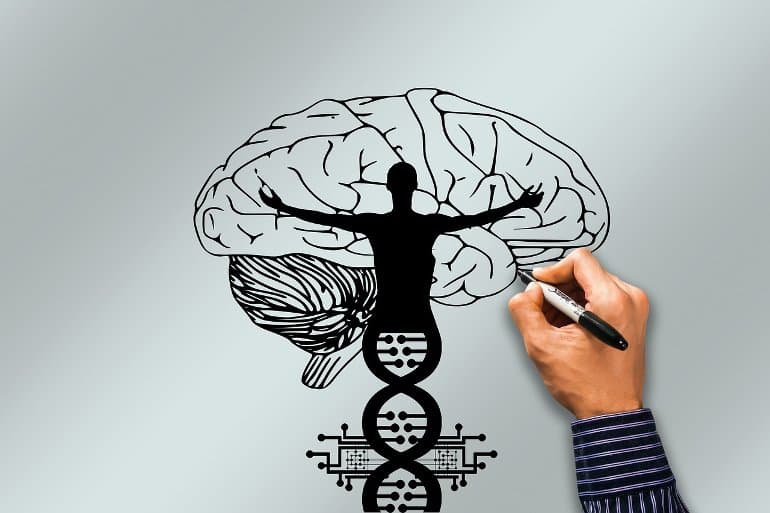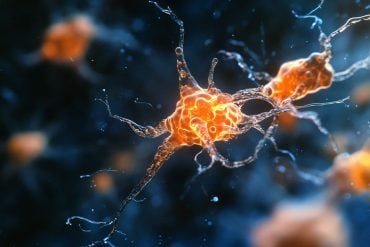Summary: An international team of scientists has identified a gene in the brain responsible for anxiety symptoms and found that modifying the gene can reduce anxiety levels, offering a novel drug target for anxiety disorders. The discovery highlights a new amygdala miR483-5p/Pgap2 pathway that regulates the brain’s response to stress and provides a potential therapeutic approach for anxiety disorders.
Source: University of Bristol
A gene in the brain driving anxiety symptoms has been identified by an international team of scientists. Critically, modification of the gene is shown to reduce anxiety levels, offering an exciting novel drug target for anxiety disorders.
The discovery, led by researchers at the Universities of Bristol and Exeter, is published online today (April 25) in Nature Communications.
Anxiety disorders are common with one in four people diagnosed with a disorder at least once in their lifetime. Severe psychological trauma can trigger genetic, biochemical and morphological changes in neurons in the brain’s amygdala—the brain region implicated in stress-induced anxiety, leading to the onset of anxiety disorders, including panic attacks and post-traumatic stress disorder.
However, the efficacy of currently available anti-anxiety drugs is low with more than half of patients not achieving remission following treatment. Limited success in developing potent anxiolytic (anti-anxiety) drugs is a result of our poor understanding of the neural circuits underlying anxiety and molecular events resulting in stress-related neuropsychiatric states.
In this study, scientists sought to identify the molecular events in the brain that underpin anxiety. They focused on a group of molecules, known as miRNAs in animal models. This important group of molecules, also found in the human brain, regulates multiple target proteins controlling the cellular processes in the amygdala.
Following acute stress, the team found an increased amount of one type of molecule called miR483-5p in a mouse amygdala. Importantly, the team showed that increased miR483-5p suppressed the expression of another gene, Pgap2, which in turn drives changes to neuronal morphology in the brain and behavior associated with anxiety.
Together, the researchers showed that miR-483-5p acts as a molecular brake that offsets stress-induced amygdala changes to promote anxiety relief.

The discovery of a novel amygdala miR483-5p/Pgap2 pathway through which the brain regulates its response to stress is the first stepping stone towards the discovery of novel, more potent and much-needed treatments for anxiety disorders that will enhance this pathway.
Dr. Valentina Mosienko, one of the study’s lead authors and an MRC Fellow and Lecturer in Neuroscience in Bristol’s School of Physiology, Pharmacology and Neuroscience, said, “Stress can trigger the onset of a number of neuropsychiatric conditions that have their roots in an adverse combination of genetic and environmental factors.
“While low levels of stress are counterbalanced by the natural capacity of the brain to adjust, severe or prolonged traumatic experiences can overcome the protective mechanisms of stress resilience, leading to the development of pathological conditions such as depression or anxiety.
“miRNAs are strategically poised to control complex neuropsychiatric conditions such as anxiety. But the molecular and cellular mechanisms they use to regulate stress resilience and susceptibility were until now, largely unknown.
“The miR483-5p/Pgap2 pathway we identified in this study, activation of which exerts anxiety-reducing effects, offers a huge potential for the development of anti-anxiety therapies for complex psychiatric conditions in humans.”
About this genetics and anxiety research news
Author: Press Office
Source: University of Bristol
Contact: Press Office – University of Bristol
Image: The image is in the public domain
Original Research: Open access.
“miR-483-5p offsets functional and behavioural effects of stress in male mice through synapse-targeted repression of Pgap2 in the basolateral amygdala” by Mariusz Mucha et al. Nature Communications
Abstract
miR-483-5p offsets functional and behavioural effects of stress in male mice through synapse-targeted repression of Pgap2 in the basolateral amygdala
Severe psychological trauma triggers genetic, biochemical and morphological changes in amygdala neurons, which underpin the development of stress-induced behavioural abnormalities, such as high levels of anxiety. miRNAs are small, non-coding RNA fragments that orchestrate complex neuronal responses by simultaneous transcriptional/translational repression of multiple target genes.
Here we show that miR-483-5p in the amygdala of male mice counterbalances the structural, functional and behavioural consequences of stress to promote a reduction in anxiety-like behaviour.
Upon stress, miR-483-5p is upregulated in the synaptic compartment of amygdala neurons and directly represses three stress-associated genes: Pgap2, Gpx3 and Macf1. Upregulation of miR-483-5p leads to selective contraction of distal parts of the dendritic arbour and conversion of immature filopodia into mature, mushroom-like dendritic spines.
Consistent with its role in reducing the stress response, upregulation of miR-483-5p in the basolateral amygdala produces a reduction in anxiety-like behaviour. Stress-induced neuromorphological and behavioural effects of miR-483-5p can be recapitulated by shRNA mediated suppression of Pgap2 and prevented by simultaneous overexpression of miR-483-5p-resistant Pgap2.
Our results demonstrate that miR-483-5p is sufficient to confer a reduction in anxiety-like behaviour and point to miR-483-5p-mediated repression of Pgap2 as a critical cellular event offsetting the functional and behavioural consequences of psychological stress.







